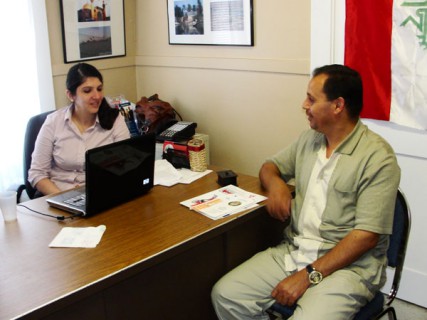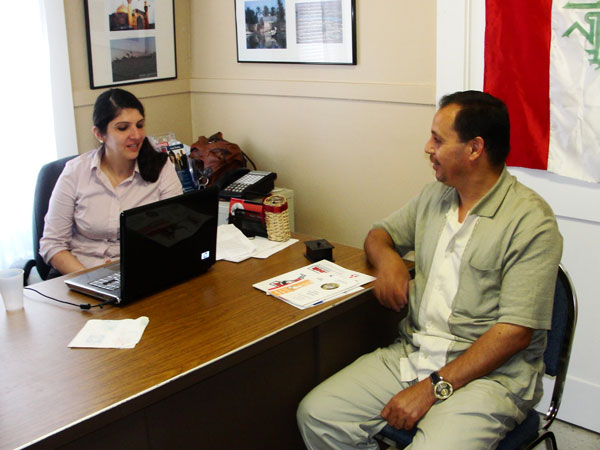LYNN, Mass. (RNS) Iman Shati is a Shiite Muslim who wears the hijab and was a housewife in Iraq. Ayfer Abed Aljabar is a Sunni Muslim who doesn't wear the hijab and worked as a lawyer in Iraq.

Ayfer Abed Aljabar is a Sunni Muslim who doesn't wear the hijab and worked as a lawyer in Iraq. Aljabar meets with a fellow Iraqi refugee.
While their backgrounds are different, the thing they have in common is a shared commitment to help fellow Iraqi refugees find work and keep their homes. They've also become fast friends.
Using money she had saved, Shati opened the Iraqi & Arab Community Association here last March, about 10 miles north of Boston, where she works as a caseworker. Aljabar, also using her own savings, last year launched the Iraqi American Community Center in Lowell, about 30 miles north of Boston.
Working separately but in common cause together, they've helped dozens of Iraqi refugee families, challenged the conventional wisdom about Muslim women and overcome doubters.
Aljabar fled Iraq with her family after assassins seeking her husband mistakenly killed his cousin. When she arrived in hardscrabble Lowell, she was surprised that the small Iraqi ex-pat community hadn't opened any Iraqi businesses or service groups.
“When I asked them, why don’t you have any Iraqi restaurants, or associations, they told me my imagination is very big,” said Aljabar, 32.
In America, both women found the opportunity — and the need — to become leaders, something that would have been much less likely in the patriarchal climate back home. Many Middle Eastern women go to university but never enter the workforce. Those who do rarely end up in leadership jobs.
“I had a lot of dreams in Iraq, but I never had a chance to make something of my dreams. When I came here to the United States, the first day I had a chance to do things. This is the difference between my country and America,” said Shati, 47, who graduated from university in Iraq but stayed home to raise her three sons.
Shati, who came with her family after her husband was kidnapped for five days, said the men in her community have been supportive.
“They’re proud, because an Iraqi woman established this,” she said. “They say, ‘She worked hard to make this agency.’ All of them support me.”
Shati also likes that in America, Muslim women attend mosque more often than in Iraq and other Muslim countries. In Islam, men are required to attend Friday prayers, but women are not.
“When I go to the masjid here, I feel like I make my relationship with God … more strong. The masjid reminds me more about my religion,” Shati said.
Shati and Aljabar help refugees get health insurance, enroll them in citizenship and English classes, accompany them to driver tests, and give them money to pay the rent, buy food, diapers, clothes and other necessities. Aljabar’s husband retrofitted several donated laptop computers with Arabic letter keys and software. Both groups also try to educate Americans about Iraqi culture.
They often use their own funds, but have also gotten help – such as discounted office space – from other agencies, and hope to catch the attention of donors who will keep the services afloat. Both women estimate they have worked with about 50 families, or about 150 people since opening their offices. Shati said nearly half the families she worked with were living in shelters.
Many resettled adults still struggle with English, which makes it hard to land a job. Their children, however, seem destined for a brighter future.
Take Tiba Faraj, an outgoing and confident junior at Classical High School in Lynn, where she has excelled as a student, made many friends, and has dreams of becoming an engineer or businesswoman.
“There’s a huge difference between here and my country. There are so many options of what we can do,” said Faraj, 17, who came here with her family after five gunmen shot into her father’s car at a traffic light, hitting him in the leg five times.
Faraj’s parents credit Shati's agency with helping them find affordable housing when they arrived, which made it easier for Faraj and her younger brothers to excel in school.
Aljabar and Shati have also developed a strong friendship, and refer to each other as “a sister.” At the same time, they also respect each other’s differences.
“I do what my God tells me,” Shati said. “He said put the hijab, so I have to do that. If another woman doesn’t like that, it’s up to her. It will be a matter between her and her God,” Shati said.
Aljabar said her decision to not wear a veil should not be seen as a measure of her piety. “Maybe my heart is stronger than a woman who’s wearing a hijab,” she said.
Shati agreed that there was more to faith than wearing a hijab, but added that for her, the hijab is also about identity.
“If we move the hijab from our heads we will mix with the other people,” she said. “Nobody knows if this is a Muslim woman. I want to show people that I’m Muslim.”
(This story was made possible by a fellowship from the French-American Foundation-United States as part of the Immigration Journalism Fellowship.)





